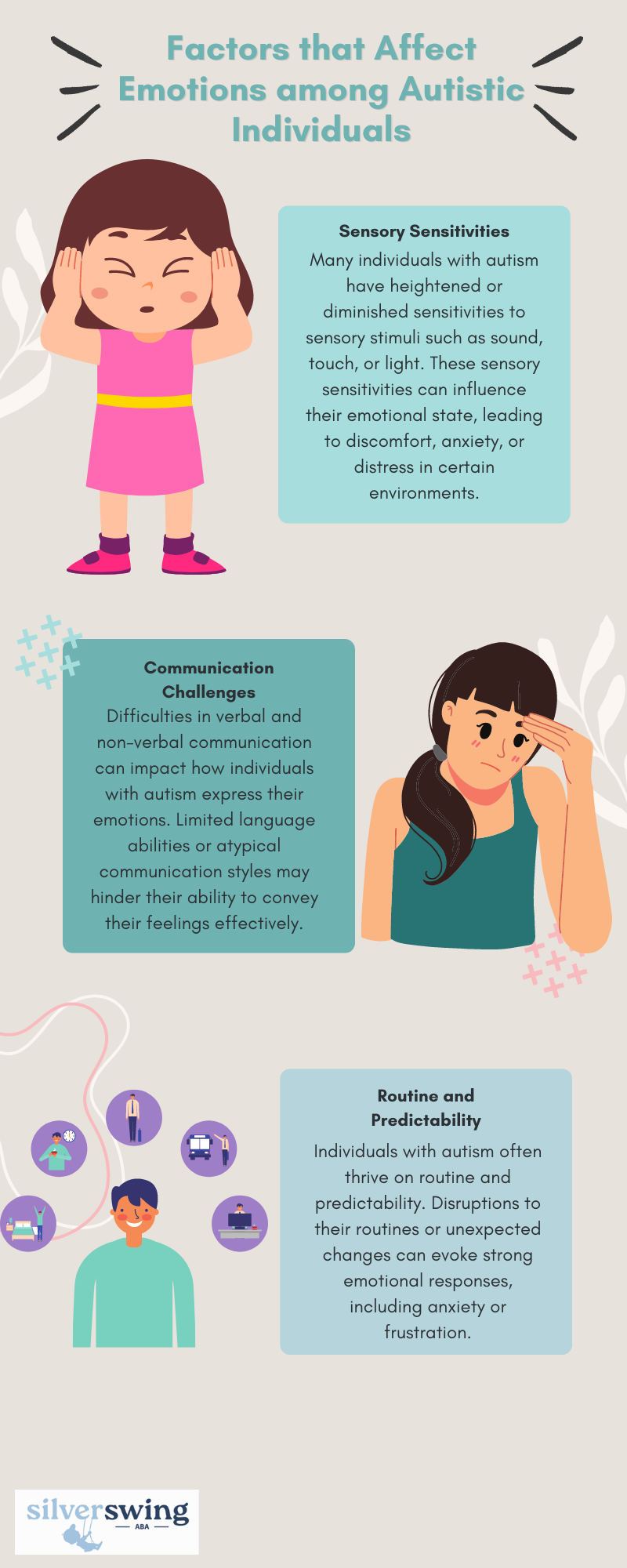Autism affects individuals in various ways, including the way they think, as well as how they perceive and express emotions. While traditionally characterized by challenges in social interaction and communication, the emotional experiences of individuals with autism are equally significant but often misunderstood or overlooked.
In this article, we’re going to explore the ways in which autism can influence emotions, backed by relevant research and insights.

Understanding Emotions in Autism
Emotions play a crucial role in human interaction, communication, and overall well-being. For individuals with autism, understanding and expressing emotions can be markedly different from neurotypical individuals. This can manifest in several ways such as:
- Emotional Regulation – Many individuals with autism experience difficulties in regulating their emotions. This includes challenges in identifying and managing their own feelings in response to internal and external stimuli. Studies have shown that these difficulties can contribute to emotional outbursts or meltdowns, which are common among autistic individuals.
- Emotional Expression – Expressing emotions through facial expressions, gestures, and tone of voice can be challenging for individuals with autism. They may have a limited range of facial expressions or use gestures differently than neurotypical individuals. This can lead to misunderstandings in social interactions, where non-verbal cues play a significant role.
- Theory of Mind – Theory of Mind refers to the ability to attribute mental states—beliefs, intents, desires, emotions—to oneself and others, and to understand that others have beliefs, desires, intentions, and perspectives that are different from one’s own. Individuals with autism often have difficulties with Theory of Mind, which can affect their understanding of others’ emotions and perspectives.
Factors Influencing Emotional Experience
There are several factors that contribute to how emotions are experienced and expressed by individuals with autism. These are as follows:

Emotional Development and Autism
Emotional development in individuals with autism may follow a different trajectory compared to neurotypical peers. While emotions themselves are universal, the way they are perceived and expressed can vary significantly.
In early childhood, parents and caregivers may notice differences in how children with autism respond to emotional cues or engage in emotional reciprocity. These differences can impact social interactions and relationships with peers.
As autistic individuals grow older, they may develop coping mechanisms to better manage their emotions and navigate social situations. However, challenges in understanding social nuances and non-verbal communication may persist into adulthood.

Support and Interventions
Understanding the emotional experiences of individuals with autism is essential for providing effective support and interventions. Here are some strategies that can help:
- Social Skills Training – Teaching individuals with autism about emotions, social cues, and appropriate responses can enhance their social interactions and emotional understanding.
- Visual Supports– Visual aids such as emotion cards, social stories, and visual schedules can help individuals with autism navigate social situations and express their emotions more effectively.
- Sensory Accommodations – Creating sensory-friendly environments and providing accommodations for sensory sensitivities can reduce emotional distress and promote emotional well-being.
To conclude, autism can indeed affect emotions in profound ways. From challenges in emotional regulation and expression to difficulties in understanding social cues and non-verbal communication, the emotional landscape for individuals with autism differs significantly from neurotypical individuals.
Recognizing these differences and providing targeted support and interventions can empower individuals with autism to navigate their emotional experiences more effectively and enhance their overall quality of life.




